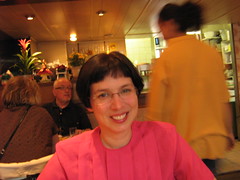I spoke at MLA last December about what I feel is problem in current academic discourse about new media:
The impact of new media on our society, and on the humanities in particular, has been widely recognized and researched, yet many faculty in the humanities seem to resist considering formal qualities of new media texts and technologies or their impact on our culture. Computer generated imagery, data bases, graphical user interfaces, and software in general constitute current media texts and affect our lives even more profoundly as literature, cinema or Television might have. Such areas as digital art and literature, code poetry, and computational music have been studied by scholars for the last ten years (at least), and study of the computers’ cultural impact has gone on longer. However, this knowledge has been slow to reach the larger academy in more than a superficial way. New media texts are rarely discussed outside of meetings, journals, and programs that focus on new media. This ghetto-ization means that the texts are only studied or accessed by specialists and are unlikely to reach the general population of scholars, which in turn keeps new media texts from reaching more scholars or students in the future. But, new media are just new texts in media culture and therefore inevitably important subjects of research for anybody dealing with texts in general.
The aesthetic components of new media have been thoroughly explored through discussions of post-humanism; historical examinations of algorithmic poetry extending from contemporary work all the way back to the Qaballah; careful charting of the evolution of terms and concepts from film theory into new media; and many other approaches to these texts. However, most scholars, in the U.S. at least, who do not specialize in new media remain only tangentially aware not only of this work on new media, but of new approaches to “old” media spawned from the novel perspectives generated in the new media studies. Further, though many theories have been advanced, such as those describing convergence, the wealth of networks, and virtual communities, that have celebrated the power of users to effect change and leverage collective intelligence, in the last few years a more critical, nuanced view has emerged. Some scholars examining media ecologies explore ways that different technologies are used in specific contexts, leading to specific impacts on the user groups. Others study how groups existing largely outside our networked society have been affected by their “paranodal” position; many take a more skeptical stance on the connection between participatory media (Web 2.0) and enhanced civic functioning; while some have suggested that Foucault’s notion of the dispositif may be combined with Actor Network Theory to better understand the complex relations between communities, technologies, and cultural meanings; and others have proposed a new category of “produsage” to describe the way users now contribute to new media production. However, many scholars outside of new media studies remain unaware of these developments, and disciplinary discussion remains bogged down in repetition.
In this presentation then, I outline some of the most recent trends in new media scholarship, the segregation of certain approaches to certain branches of the humanities, and suggest ways that new media in general and its socio-cultural impact in particular might be better and more widely addressed, both in literature and in composition/rhetoric.
- First, new media means something totally different in the US than in Europe. Here it means digital or computer media, ala Lev Manovich, but in Europe TV and radio are often included in that, in fact, from a historical perspective, all media is new at some point. As Communcations Studies departments are now also talking about “new media” and technology in a manner similar to discussions of other mass media, the term new media is not even really serving to make a distinction from mass media any more.
- In the US, New Media also is often (though not always) far more focused on educational techologies, for example, most collegiate member links in the New Media Consortium point to the schools’ IT offices, not to academic programs. Or it may be confined to one discipline–literature or visual arts.
- European programs tend to be far more interdisciplinary, focused on critical theory, on cultural interpretations, and on the philosophy of science.
- Second, the terms medium and media are being used incorrectly throughout the field. For example, if we speak of radio, one of the earliest technologies to be discussed as a medium, then technically the medium, the carrier of radio waves, is air. This was then extended metonymically to include the waves themselves, then further expanded to include the devices themselves, the senders, and even the receivers (that is the people sending and receiving). So that the term now encompasses so much, it’s not even very useful.
- It seems we are talking about technologies and about cultural/literary/artistic practices. On the one hand a new term might be useful, on the other hand, talking about culture and technology might be a simpler solution.
- Whatever we call it, the actual theories and texts need to be better integrated in coursework, so that students understand the extent to which technical and cultural changes have occurred and need to be considered–this points toward a notion raised several times during conference, that we are not talking just about a new genre, but a qualitative change to the entire discipline.
